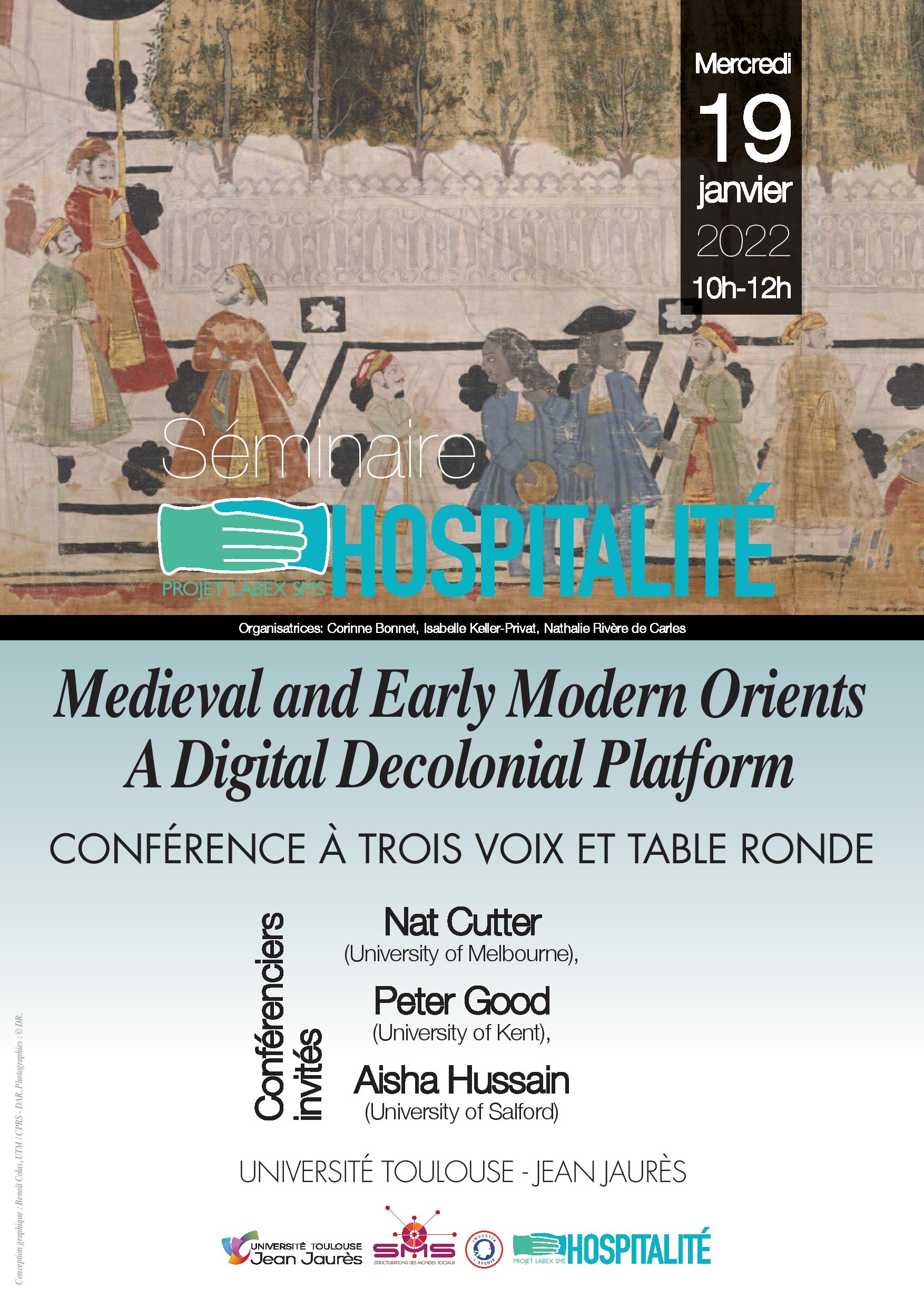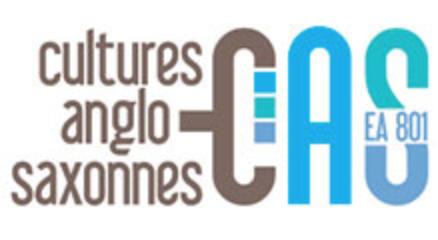-
Partager cette page
Medieval and Early Modern Orients - A Digital Decolonial Platform / MEMO : un outil numérique décolonial
Publié le 5 janvier 2022 – Mis à jour le 5 janvier 2022
le 19 janvier 2022
10h-12h
En ligne
Conférenciers / Speakers:
Medieval and Early Modern Orients is a decolonial research platform and digital hub aimed at providing accessible and relevant content to academics and researchers working in pre-modern historical, literary and cultural studies with research interests in ‘Orients’ or the Islamic world, while also making academic research accessible to non-scholarly audiences with similar interests. It also aims to create a rich, global academic community of researchers working on early histories of the Islamic world and its encounters with Europe. Over the course of this presentation, I will present an overview of the ideas that shaped the project, its conception and development, and a walk-through of the platform itself. This will include explanations of the content including the pre-modern time frame; the geographic arena; the terminology; as well as the various research methodologies and disciplines that are central to the platform. The presentation will also explore the digital organisation of the page, and how it is curated, informed by best and recent practices in the digital humanities and increasing movements towards decolonial research and pedagogy. The speakers will focus on a few specific areas of research covered by members of the group, paying attention in particular to research on travel and migration; hospitality and diplomacy; and transculturality. They will also demonstrate some of the data they have drawn from usership and particularly show how we use this to productively inform the way we continue to grow the platform. They will highlight some of our key partners and the collaborative projects they have undertaken to produce both academic and public-facing research, working with institutions such as the Folger Shakespeare Library, the Hakluyt Society, the British Library, and the Society for Renaissance Studies. Finally, they will convey some points on future directions for MEMOs.
Medieval and Early Modern Orients est une plateforme de recherche décoloniale et un centre numérique visant à fournir un contenu accessible et pertinent aux universitaires et aux chercheurs travaillant dans le domaine des études historiques, littéraires et culturelles de la première modernité et s'intéressant aux "Orients" ou au monde islamique, tout en rendant la recherche universitaire accessible à un public non universitaire ayant des intérêts similaires. Il vise également à créer une communauté académique riche et mondiale de chercheurs travaillant sur les premières histoires du monde islamique et ses rencontres avec l'Europe. Au cours de cette présentation, je présenterai un aperçu des idées qui ont façonné le projet, sa conception et son développement, ainsi qu'une visite de la plate-forme elle-même. Cela comprendra des explications sur le contenu, y compris le cadre temporel de la première modernité, l’aire géographique, la terminologie, ainsi que les diverses méthodologies et disciplines de recherche qui sous-tendent la création et l’utilisation de la plateforme. La présentation explorera également l'organisation numérique de la page et la façon dont elle est conservée, en s'inspirant des pratiques les plus efficaces et récentes dans les humanités numériques et de l’orientation décoloniale de la recherche et la pédagogie. Nous nous concentrerons sur quelques domaines de recherche spécifiques couverts par les membres du groupe, en accordant une attention particulière à la recherche sur le voyage et la migration ; l'hospitalité et la diplomatie ; et la transculturalité. Les conférenciers présenteront également certaines des données obtenues jusqu’à présent et montrerai comment nous les utilisons pour mettre à jour et continuer le développement de la plateforme. Ils souligneront certains de leurs partenaires clés et les projets de collaboration entrepris pour produire des recherches à la fois académiques et publiques, en travaillant avec des institutions telles que la Folger Shakespeare Library, la Hakluyt Society, la British Library et la Society for Renaissance Studies. Enfin, ils évoqueront quelques-unes des orientations futures de MEMO.
Organisation :
Corinne Bonnet, Isabelle Keller-Privat, Nathalie Rivère de Carles
Illustration :
Maharana Sangram Singh receives the embassy of Johan Josua Ketelaar, c. 1711
- Nat Cutter, University of Melbourne
- Peter Good, University of Kent
- Aisha Hussain, University of Salford
Medieval and Early Modern Orients is a decolonial research platform and digital hub aimed at providing accessible and relevant content to academics and researchers working in pre-modern historical, literary and cultural studies with research interests in ‘Orients’ or the Islamic world, while also making academic research accessible to non-scholarly audiences with similar interests. It also aims to create a rich, global academic community of researchers working on early histories of the Islamic world and its encounters with Europe. Over the course of this presentation, I will present an overview of the ideas that shaped the project, its conception and development, and a walk-through of the platform itself. This will include explanations of the content including the pre-modern time frame; the geographic arena; the terminology; as well as the various research methodologies and disciplines that are central to the platform. The presentation will also explore the digital organisation of the page, and how it is curated, informed by best and recent practices in the digital humanities and increasing movements towards decolonial research and pedagogy. The speakers will focus on a few specific areas of research covered by members of the group, paying attention in particular to research on travel and migration; hospitality and diplomacy; and transculturality. They will also demonstrate some of the data they have drawn from usership and particularly show how we use this to productively inform the way we continue to grow the platform. They will highlight some of our key partners and the collaborative projects they have undertaken to produce both academic and public-facing research, working with institutions such as the Folger Shakespeare Library, the Hakluyt Society, the British Library, and the Society for Renaissance Studies. Finally, they will convey some points on future directions for MEMOs.
Medieval and Early Modern Orients est une plateforme de recherche décoloniale et un centre numérique visant à fournir un contenu accessible et pertinent aux universitaires et aux chercheurs travaillant dans le domaine des études historiques, littéraires et culturelles de la première modernité et s'intéressant aux "Orients" ou au monde islamique, tout en rendant la recherche universitaire accessible à un public non universitaire ayant des intérêts similaires. Il vise également à créer une communauté académique riche et mondiale de chercheurs travaillant sur les premières histoires du monde islamique et ses rencontres avec l'Europe. Au cours de cette présentation, je présenterai un aperçu des idées qui ont façonné le projet, sa conception et son développement, ainsi qu'une visite de la plate-forme elle-même. Cela comprendra des explications sur le contenu, y compris le cadre temporel de la première modernité, l’aire géographique, la terminologie, ainsi que les diverses méthodologies et disciplines de recherche qui sous-tendent la création et l’utilisation de la plateforme. La présentation explorera également l'organisation numérique de la page et la façon dont elle est conservée, en s'inspirant des pratiques les plus efficaces et récentes dans les humanités numériques et de l’orientation décoloniale de la recherche et la pédagogie. Nous nous concentrerons sur quelques domaines de recherche spécifiques couverts par les membres du groupe, en accordant une attention particulière à la recherche sur le voyage et la migration ; l'hospitalité et la diplomatie ; et la transculturalité. Les conférenciers présenteront également certaines des données obtenues jusqu’à présent et montrerai comment nous les utilisons pour mettre à jour et continuer le développement de la plateforme. Ils souligneront certains de leurs partenaires clés et les projets de collaboration entrepris pour produire des recherches à la fois académiques et publiques, en travaillant avec des institutions telles que la Folger Shakespeare Library, la Hakluyt Society, la British Library et la Society for Renaissance Studies. Enfin, ils évoqueront quelques-unes des orientations futures de MEMO.
Organisation :
Corinne Bonnet, Isabelle Keller-Privat, Nathalie Rivère de Carles
Illustration :
Maharana Sangram Singh receives the embassy of Johan Josua Ketelaar, c. 1711
Partenaires :
Medieval and Early Modern Orients (MEMOs) (AHRC)
Labex Hospitalité (UR801 Cultures Anglo-Saxonnes-Université Toulouse Jean Jaurès)
DiplomaticA (UR801, Cultures Anglo-Saxonnes-Université Toulouse Jean Jaurès).
Labex Hospitalité (UR801 Cultures Anglo-Saxonnes-Université Toulouse Jean Jaurès)
DiplomaticA (UR801, Cultures Anglo-Saxonnes-Université Toulouse Jean Jaurès).
Contact :
Isabelle Keller-Privat, - isabelle.keller-privat@univ-tlse2.fr

